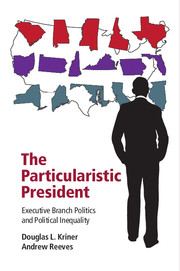Book contents
- Frontmatter
- Contents
- List of Tables
- List of Illustrations
- Acknowledgments
- 1 Introduction
- 2 The Origins of Presidential Particularism
- 3 Base Closings and Trade
- 4 Disaster Declarations and Transportation Grants
- 5 Federal Grants and Presidential Particularism
- 6 The Electoral Rewards of Presidential Particularism
- 7 Conclusion
- Appendix A Technical Appendix to Chapter 3
- Appendix B Technical Appendix to Chapter 4
- Appendix C Technical Appendix to Chapter 5
- Appendix D Technical Appendix to Chapter 6
- References
- Index
4 - Disaster Declarations and Transportation Grants
Published online by Cambridge University Press: 05 June 2015
- Frontmatter
- Contents
- List of Tables
- List of Illustrations
- Acknowledgments
- 1 Introduction
- 2 The Origins of Presidential Particularism
- 3 Base Closings and Trade
- 4 Disaster Declarations and Transportation Grants
- 5 Federal Grants and Presidential Particularism
- 6 The Electoral Rewards of Presidential Particularism
- 7 Conclusion
- Appendix A Technical Appendix to Chapter 3
- Appendix B Technical Appendix to Chapter 4
- Appendix C Technical Appendix to Chapter 5
- Appendix D Technical Appendix to Chapter 6
- References
- Index
Summary
In the previous chapter, we searched for evidence of presidential particularism in military base closings and trade policy. In both cases, we found that presidents favored the interests of some Americans over others. In some cases, presidents sought to court key swing voters; in others, they endeavored to protect their partisan allies from economic pain and instead concentrate it in constituencies that backed the partisan opposition. This stands in stark contrast to the conventional wisdom of presidential universalism, where presidents eschew parochialism and instead pursue policies that maximize outcomes for the nation as a whole. In this chapter, we look for further evidence of presidential particularism by analyzing presidential disaster declarations and executive influence over the allocation of transportation grants.
Presidential decisions concerning whether or not to issue a federal disaster declaration present an ideal venue to examine presidential motivations because the stimulus (severe weather) is determined outside the political system and creates a direct need for relief. As a result, we can assess whether – after controlling for storm damage and objective economic need – political factors influence the allocation of federal disaster aid. Although need is the preeminent determinant of presidential disaster declarations, our data unambiguously show that these presidential directives are also influenced by whether the affected area is in a battleground state or a core partisan constituency.
Shifting focus to the politics of transportation grants affords us an opportunity to look for evidence of presidential particularism in a realm where presidents do not have unilateral authority over policymaking. Indeed, transportation funding is a policy realm long held to be dominated not by the president but by Congress. As a result, transportation grants serve as a critical test for our argument; if we find evidence of presidential particularism here, there are strong reasons to expect to find it in a myriad of other policy realms as well.
Presidential Disaster Declarations
Disaster declarations are opportunities for presidents to make unilateral decisions about distributive politics. Moreover, in this policy realm we are able to measure accurately and objectively economic need – the dollar amount of damage caused by the severe weather.
- Type
- Chapter
- Information
- The Particularistic PresidentExecutive Branch Politics and Political Inequality, pp. 82 - 109Publisher: Cambridge University PressPrint publication year: 2015

